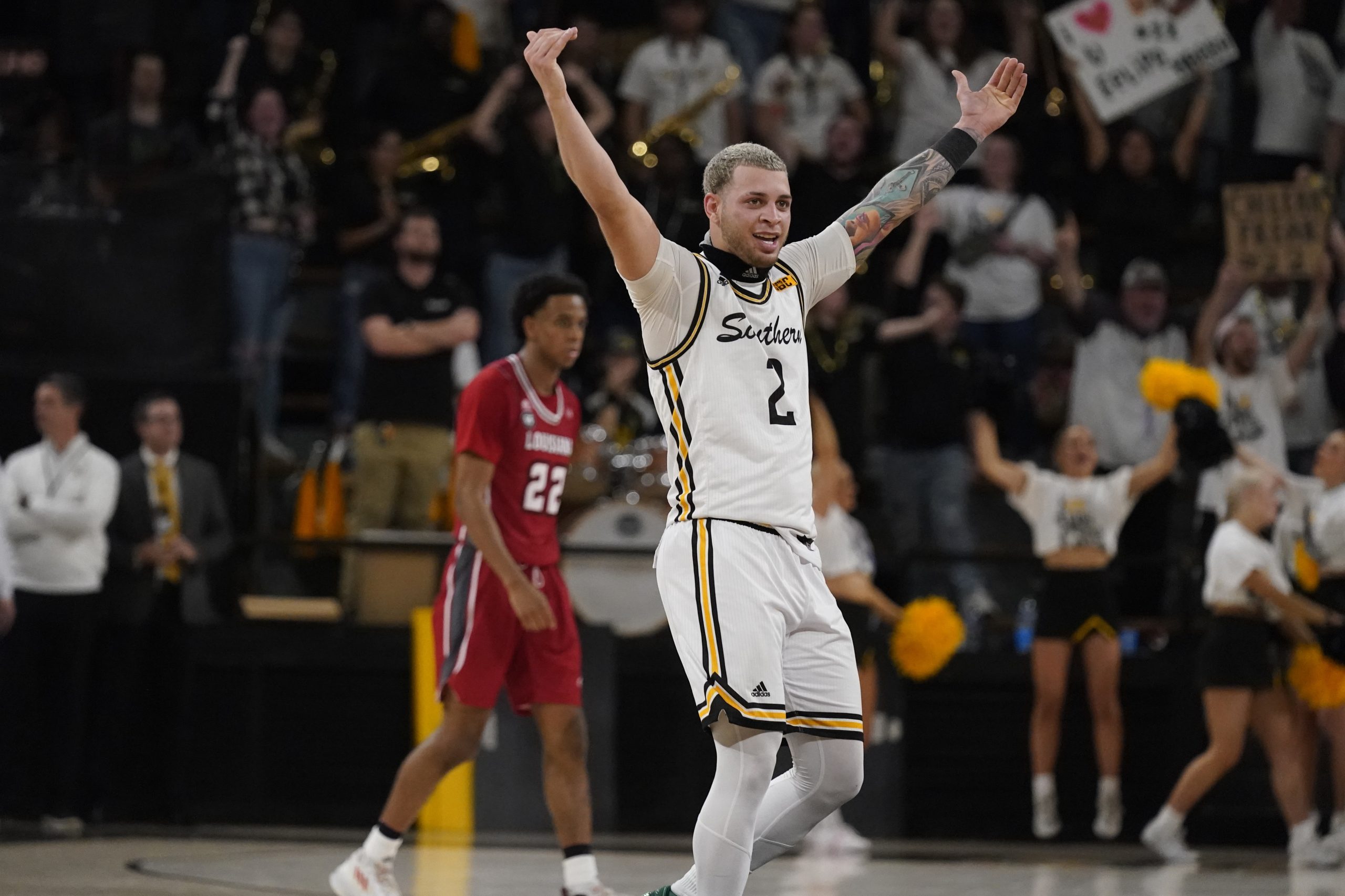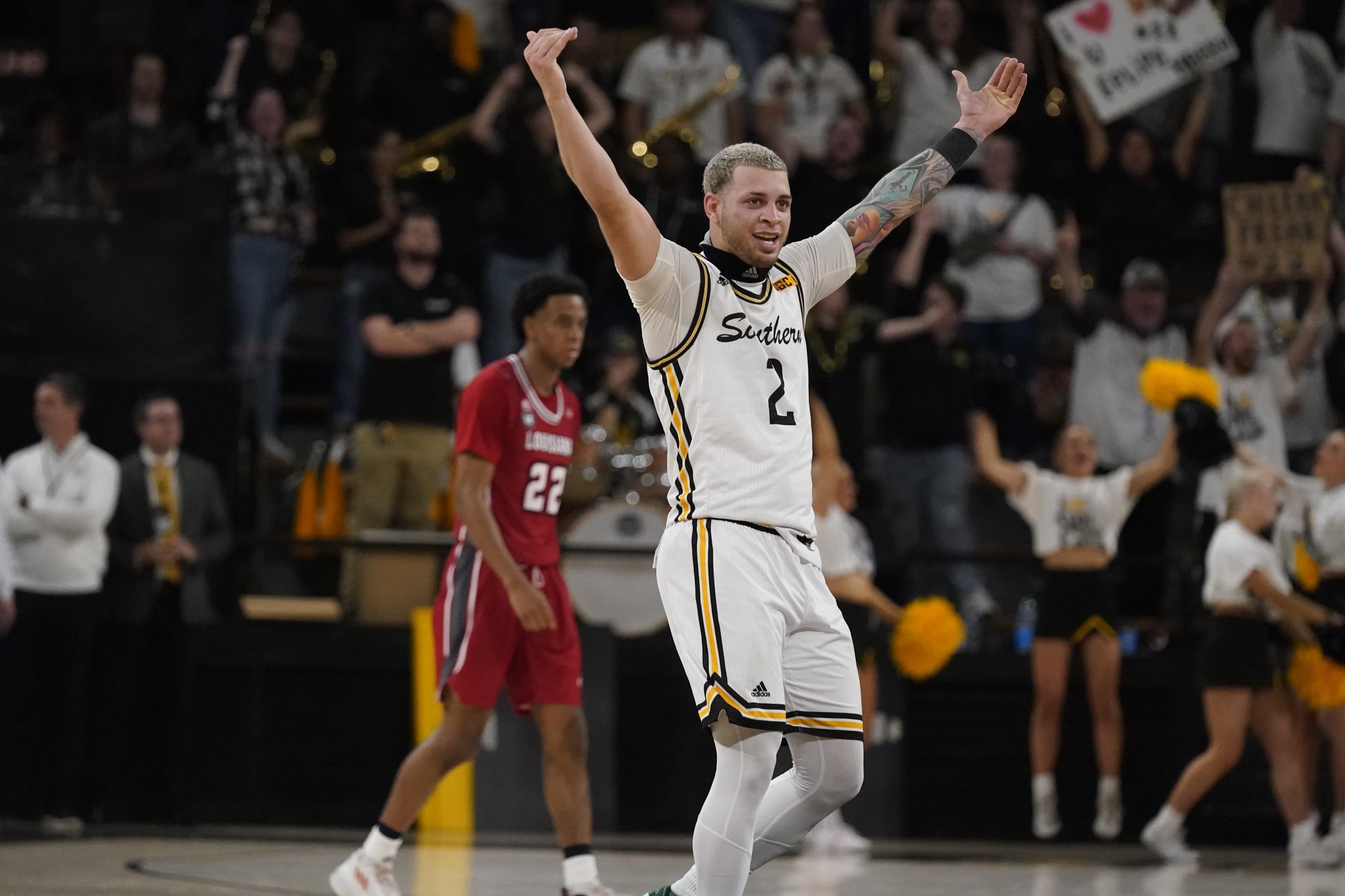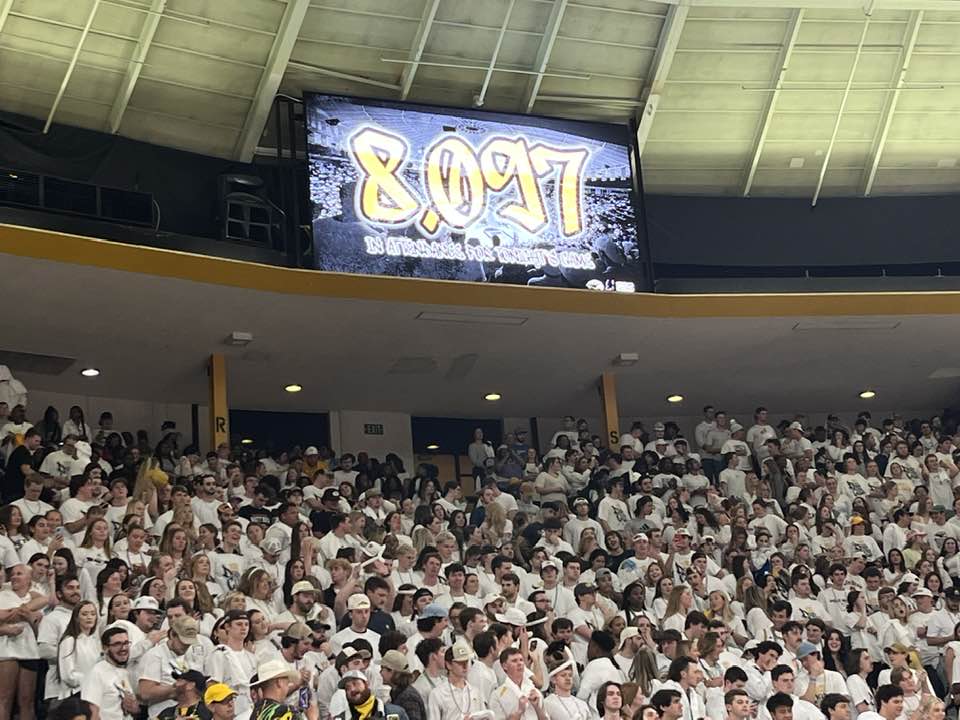Mississippi Today
College basketball’s Lazarus? Look no farther than Southern Miss


College basketball’s Lazarus? Look no farther than Southern Miss
HATTIESBURG — The Louisiana Cajuns were raining bright red all over Southern Miss’s basketball parade. The Cajuns, who had won 10 straight, led by 10 points with four minutes and change to go in the first half. The Golden Eagles were drowning in a sea of missed shots and foul trouble.
Louisiana’s all-Sun Belt Conference forward Jordan Brown was scoring seemingly at will. No Golden Eagle could stay in front of Themus Folks, Louisiana’s left-handed whirling dervish of a point guard. Worse, Southern Miss stars Felipe Haase and Austin Crowley were largely ineffective, Crowley on the bench in foul trouble and Hasse scoreless having missed all five of his shots and without a single rebound. It seemed Hasse and many of his teammates were shooting at a moving target.

Thursday night’s mid-major showdown was fast becoming a beat-down. A raucous crowd of 8,097 at Green Coliseum — the first sellout in 14 years here — was watching what seemed a replay of so many USM basketball debacles in recent seasons.
That’s right. Bleak doesn’t begin to describe the Golden Eagles’ situation, and perhaps that’s appropriate. Nothing is supposed to be easy – and it’s not – for this team, which has become college basketball’s version of Lazarus. Of course, Lazarus, in the Bible, was buried for four days. These Eagles have been dormant for years.
READ MORE: The stunning transformation of USM basketball
By now, most readers will know that Southern Miss fired back for a 82-71 victory, its 22nd of the season against just four defeats. The Eagles erased the 10-point deficit and won by 11, edging one game ahead of Louisiana in the tight Sun Belt race.
Hasse, the multi-talented Chilean, scored all of his 17 points in the second half. Crowley started the second half and announced his presence with a long, rainbow-like three-pointer that immediately got the crowd back into it. DeAndre Pinckney poured through 14 of his team-high 22 points in the last 20 minutes. Green Coliseum — the Greenhouse, it is called around here — became a noise factory. Just three months ago, you almost could have a conversation with someone across the court in this place. Now, you can’t hear yourself think. It is difficult to describe just how loud it was, and it seemed to lift the Eagles to a much higher level of play. Southern Miss shot a blistering 62% in the second half, and 63% from beyond the three-point arc.

“An incredible euphoria,” was how Jay Ladner, the Southern Miss coach described the atmosphere.
“It just makes me so happy to see all the little kids running around with big smiles on their faces and so many grown-ups acting like kids,” Ladner said.
Hasse, Crowley and Pinkney have provided three-pronged leadership all season in this outhouse-to-penthouse story. That said, it took so much more than their prowess to secure the biggest Southern Miss basketball victory since many of these kids with big smiles on their faces have been alive.
My MVP vote this night would go to Neftali Alvarez, the irrepressible Puerto Rican point guard who has come back from a leg injury to provide instant energy off the USM bench. Nefta, as his teammates call him, applied constant defensive pressure, directed the offense, and somehow weaved and muscled his way to the bucket for critical baskets. He scored 17 points, passed out four assists, stole the ball twice and played his best basketball during that critical period late in the first half when Southern Miss cut that 10-point deficit down to a manageable five.
But it took more than Alvarez’s heroics, as well. Big Tyler Mormon came off the bench to slow – if not completely stop – Louisiana’s talented Brown. After scoring 16 points on 7 of 11 shooting in the first half, Brown scored nine points, including just two of six field goals, in the second. Donovan Ivory was also huge off the bench for the Eagles, scoring seven points and defending well in his 22 minutes of playing time. The Golden Eagles out-scored the Cajuns by 18 points while Ivory was on the floor. That was better even than Crowley, the sharp-shooting Ole Miss transfer. USM was a plus-17 during Crowley’s 27 minutes of playing time.
What is becoming increasingly apparent with each USM victory is how much this team enjoys one another. They willingly share the basketball. They constantly encourage one another. They appear to be having so much fun.
You can even see it in the warm-ups when they come out in their cover-up shirts that say “Southern Miss grit” on the front and the number “14” on the back. Wait, you say, everybody can’t be number 14. No, but that’s where Southern Miss was picked to finish in the Sun Belt Conference, 14th of 14 teams.
Instead, for now, fast approaching March Madness, they are first, but they wear that “14” like a badge. They have Southern Miss fans by the thousands pinching themselves and asking, “Is this real?”
The young’uns’ big smiles — and the grown-ups acting like kids — serve as a definitive and affirmative answer.
This article first appeared on Mississippi Today and is republished here under a Creative Commons license.
Did you miss our previous article…
https://www.biloxinewsevents.com/?p=208123
Mississippi Today
On this day in 1939, Billie Holiday recorded ‘Strange Fruit’

April 20, 1939

Legendary jazz singer Billie Holiday stepped into a Fifth Avenue studio and recorded “Strange Fruit,” a song written by Jewish civil rights activist Abel Meeropol, a high school English teacher upset about the lynchings of Black Americans — more than 6,400 between 1865 and 1950.
Meeropol and his wife had adopted the sons of Julius and Ethel Rosenberg, who were orphaned after their parents’ executions for espionage.
Holiday was drawn to the song, which reminded her of her father, who died when a hospital refused to treat him because he was Black. Weeks earlier, she had sung it for the first time at the Café Society in New York City. When she finished, she didn’t hear a sound.
“Then a lone person began to clap nervously,” she wrote in her memoir. “Then suddenly everybody was clapping.”
The song sold more than a million copies, and jazz writer Leonard Feather called it “the first significant protest in words and music, the first unmuted cry against racism.”
After her 1959 death, both she and the song went into the Grammy Hall of Fame, Time magazine called “Strange Fruit” the song of the century, and the British music publication Q included it among “10 songs that actually changed the world.”
David Margolick traces the tune’s journey through history in his book, “Strange Fruit: Billie Holiday and the Biography of a Song.” Andra Day won a Golden Globe for her portrayal of Holiday in the film, “The United States vs. Billie Holiday.”
This article first appeared on Mississippi Today and is republished here under a Creative Commons Attribution-NoDerivatives 4.0 International License.![]()
Mississippi Today
Mississippians are asked to vote more often than people in most other states

Not long after many Mississippi families celebrate Easter, they will be returning to the polls to vote in municipal party runoff elections.
The party runoff is April 22.
A year does not pass when there is not a significant election in the state. Mississippians have the opportunity to go to the polls more than voters in most — if not all — states.
In Mississippi, do not worry if your candidate loses because odds are it will not be long before you get to pick another candidate and vote in another election.
Mississippians go to the polls so much because it is one of only five states nationwide where the elections for governor and other statewide and local offices are held in odd years. In Mississippi, Kentucky and Louisiana, the election for governor and other statewide posts are held the year after the federal midterm elections. For those who might be confused by all the election lingo, the federal midterms are the elections held two years after the presidential election. All 435 members of the U.S. House and one-third of the membership of the U.S. Senate are up for election during every midterm. In Mississippi, there also are important judicial elections that coincide with the federal midterms.
Then the following year after the midterms, Mississippians are asked to go back to the polls to elect a governor, the seven other statewide offices and various other local and district posts.
Two states — Virginia and New Jersey — are electing governors and other state and local officials this year, the year after the presidential election.
The elections in New Jersey and Virginia are normally viewed as a bellwether of how the incumbent president is doing since they are the first statewide elections after the presidential election that was held the previous year. The elections in Virginia and New Jersey, for example, were viewed as a bad omen in 2021 for then-President Joe Biden and the Democrats since the Republican in the swing state of Virginia won the Governor’s Mansion and the Democrats won a closer-than-expected election for governor in the blue state of New Jersey.
With the exception of Mississippi, Louisiana, Kentucky, Virginia and New Jersey, all other states elect most of their state officials such as governor, legislators and local officials during even years — either to coincide with the federal midterms or the presidential elections.
And in Mississippi, to ensure that the democratic process is never too far out of sight and mind, most of the state’s roughly 300 municipalities hold elections in the other odd year of the four-year election cycle — this year.
The municipal election impacts many though not all Mississippians. Country dwellers will have no reason to go to the polls this year except for a few special elections. But in most Mississippi municipalities, the offices for mayor and city council/board of aldermen are up for election this year.
Jackson, the state’s largest and capital city, has perhaps the most high profile runoff election in which state Sen. John Horhn is challenging incumbent Mayor Chokwe Antar Lumumba in the Democratic primary.
Mississippi has been electing its governors in odd years for a long time. The 1890 Mississippi Constitution set the election for governor for 1895 and “every four years thereafter.”
There is an argument that the constant elections in Mississippi wears out voters, creating apathy resulting in lower voter turnout compared to some other states.
Turnout in presidential elections is normally lower in Mississippi than the nation as a whole. In 2024, despite the strong support for Republican Donald Trump in the state, 57.5% of registered voters went to the polls in Mississippi compared to the national average of 64%, according to the United States Elections Project.
In addition, Mississippi Today political reporter Taylor Vance theorizes that the odd year elections for state and local officials prolonged the political control for Mississippi Democrats. By 1948, Mississippians had started to vote for a candidate other than the Democrat for president. Mississippians began to vote for other candidates — first third party candidates and then Republicans — because of the national Democratic Party’s support of civil rights.
But because state elections were in odd years, it was easier for Mississippi Democrats to distance themselves from the national Democrats who were not on the ballot and win in state and local races.
In the modern Mississippi political environment, though, Republicans win most years — odd or even, state or federal elections. But Democrats will fare better this year in municipal elections than they do in most other contests in Mississippi, where the elections come fast and often.
This article first appeared on Mississippi Today and is republished here under a Creative Commons Attribution-NoDerivatives 4.0 International License.
Mississippi Today
On this day in 1977, Alex Haley awarded Pulitzer for ‘Roots’

April 19, 1977

Alex Haley was awarded a special Pulitzer Prize for “Roots,” which was also adapted for television.
Network executives worried that the depiction of the brutality of the slave experience might scare away viewers. Instead, 130 million Americans watched the epic miniseries, which meant that 85% of U.S. households watched the program.
The miniseries received 36 Emmy nominations and won nine. In 2016, the History Channel, Lifetime and A&E remade the miniseries, which won critical acclaim and received eight Emmy nominations.
This article first appeared on Mississippi Today and is republished here under a Creative Commons Attribution-NoDerivatives 4.0 International License.![]()
-

 News from the South - Alabama News Feed5 days ago
News from the South - Alabama News Feed5 days agoFoley man wins Race to the Finish as Kyle Larson gets first win of 2025 Xfinity Series at Bristol
-

 News from the South - Alabama News Feed6 days ago
News from the South - Alabama News Feed6 days agoFederal appeals court upholds ruling against Alabama panhandling laws
-

 News from the South - Florida News Feed7 days ago
News from the South - Florida News Feed7 days agoJacksonville University only school with 2 finalist teams in NASA’s 2025 Human Lander Challenge
-

 News from the South - North Carolina News Feed5 days ago
News from the South - North Carolina News Feed5 days agoFDA warns about fake Ozempic, how to spot it
-

 News from the South - Virginia News Feed4 days ago
News from the South - Virginia News Feed4 days agoLieutenant governor race heats up with early fundraising surge | Virginia
-

 News from the South - Oklahoma News Feed3 days ago
News from the South - Oklahoma News Feed3 days agoThursday April 17, 2025 TIMELINE: Severe storms Friday
-

 News from the South - Arkansas News Feed6 days ago
News from the South - Arkansas News Feed6 days agoTwo dead, 9 injured after shooting at Conway park | What we know
-

 News from the South - Missouri News Feed5 days ago
News from the South - Missouri News Feed5 days agoAbandoned property causing issues in Pine Lawn, neighbor demands action


















































